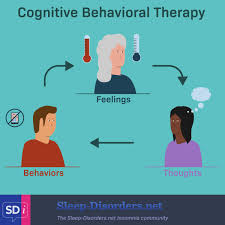The Benefits of Stress Therapy
Stress has become a common part of modern life, affecting individuals in various ways. From work pressures to personal challenges, stress can take a toll on our physical and mental well-being. This is where stress therapy comes in as a valuable tool to help individuals manage and overcome stress effectively.
Stress therapy encompasses a range of techniques and approaches designed to reduce stress levels, improve coping mechanisms, and enhance overall resilience. One popular form of stress therapy is cognitive-behavioral therapy (CBT), which focuses on changing negative thought patterns and behaviors that contribute to stress.
Another effective approach to stress therapy is mindfulness-based stress reduction (MBSR), which involves practicing mindfulness meditation and other mindfulness techniques to increase awareness and reduce reactivity to stressful situations.
Benefits of stress therapy include:
- Improved Coping Skills: Stress therapy equips individuals with effective coping strategies to deal with challenging situations in a healthier way.
- Reduced Anxiety: By addressing the root causes of stress and anxiety, therapy helps individuals manage their symptoms more effectively.
- Better Emotional Regulation: Therapy can help individuals regulate their emotions more skillfully, leading to improved emotional well-being.
- Enhanced Resilience: Through therapy, individuals can build resilience to better withstand and bounce back from stressful events.
If you’re experiencing chronic stress or feeling overwhelmed by life’s demands, consider seeking support through stress therapy. A trained therapist can work with you to develop personalized strategies for managing stress and improving your overall quality of life.
Remember, it’s important to prioritize your mental health and well-being. Seeking help through stress therapy is a proactive step toward living a more balanced and fulfilling life.
8 Effective Tips for Managing Stress and Enhancing Well-Being
- Practice deep breathing exercises to calm the mind.
- Engage in regular physical activity to release endorphins.
- Set aside time for hobbies and activities you enjoy.
- Maintain a balanced diet to support overall well-being.
- Establish a consistent sleep schedule for better rest.
- Try mindfulness or meditation techniques daily.
- Connect with friends or family for social support.
- Limit caffeine and alcohol consumption.
Practice deep breathing exercises to calm the mind.
Practicing deep breathing exercises is a simple yet powerful tip in stress therapy to calm the mind and reduce feelings of anxiety and tension. Deep breathing techniques help activate the body’s relaxation response, promoting a sense of calmness and clarity. By focusing on slow, deep breaths, individuals can regulate their heart rate, lower blood pressure, and quiet the mind, creating a peaceful state that can alleviate stress and promote overall well-being. Incorporating deep breathing exercises into your daily routine can be an effective way to manage stress and enhance your mental health.
Engage in regular physical activity to release endorphins.
Engaging in regular physical activity is a highly effective tip for managing stress through therapy. When we exercise, our bodies release endorphins, often referred to as “feel-good” hormones. These endorphins act as natural painkillers and mood elevators, helping to reduce stress levels and promote a sense of well-being. Whether it’s going for a brisk walk, practicing yoga, or hitting the gym, incorporating physical activity into your routine can be a powerful way to combat stress and improve your overall mental health.
Set aside time for hobbies and activities you enjoy.
Setting aside time for hobbies and activities you enjoy is a valuable tip in stress therapy. Engaging in activities that bring you joy and fulfillment can help alleviate stress, promote relaxation, and improve overall well-being. Whether it’s painting, gardening, playing music, or practicing yoga, dedicating time to your hobbies allows you to unwind, recharge, and focus on something positive outside of your daily responsibilities. By prioritizing activities that bring you pleasure, you can create a healthy balance in your life and cultivate a sense of purpose that contributes to your mental and emotional resilience.
Maintain a balanced diet to support overall well-being.
Maintaining a balanced diet is a crucial aspect of stress therapy as it plays a significant role in supporting overall well-being. A nutritious diet rich in essential vitamins, minerals, and antioxidants can help regulate mood, energy levels, and cognitive function, all of which are important for managing stress effectively. By fueling our bodies with the right nutrients, we can enhance our resilience to stress and promote physical and mental health. Incorporating whole foods such as fruits, vegetables, lean proteins, and whole grains into our diet can provide the necessary nourishment to combat stress and improve our overall quality of life.
Establish a consistent sleep schedule for better rest.
Establishing a consistent sleep schedule is a valuable tip in stress therapy for promoting better rest and overall well-being. By maintaining regular bedtimes and wake-up times, you can regulate your body’s internal clock, known as the circadian rhythm, which plays a crucial role in ensuring restful and rejuvenating sleep. Consistency in your sleep routine can help improve the quality of your rest, reduce feelings of fatigue and irritability, and enhance your ability to cope with daily stressors. Prioritizing a stable sleep schedule is a simple yet effective way to support your mental health and resilience in managing stress.
Try mindfulness or meditation techniques daily.
Incorporating mindfulness or meditation techniques into your daily routine can be a powerful tool in managing stress. Taking a few moments each day to practice mindfulness or meditation allows you to center yourself, focus on the present moment, and cultivate a sense of inner calm. These practices can help reduce anxiety, improve emotional regulation, and enhance overall resilience in the face of stressors. By making mindfulness or meditation a daily habit, you can create a space for peace and relaxation amidst life’s challenges.
Connect with friends or family for social support.
Connecting with friends or family for social support is a valuable tip in stress therapy. Building and maintaining strong relationships can provide a sense of belonging, comfort, and understanding during challenging times. By sharing your feelings and experiences with loved ones, you not only feel supported but also gain different perspectives and coping strategies. The emotional connection and empathy offered by friends and family can help reduce feelings of isolation and loneliness, promoting overall well-being and resilience in managing stress effectively.
Limit caffeine and alcohol consumption.
Limiting caffeine and alcohol consumption can play a significant role in managing stress effectively. While caffeine may provide a temporary energy boost, excessive intake can exacerbate feelings of anxiety and restlessness. Similarly, alcohol, often used as a coping mechanism, can disrupt sleep patterns and contribute to heightened stress levels. By moderating the consumption of these substances, individuals can support their mental well-being and promote better stress management practices. Making mindful choices about caffeine and alcohol intake can lead to improved overall health and a more balanced approach to handling stressors in daily life.




